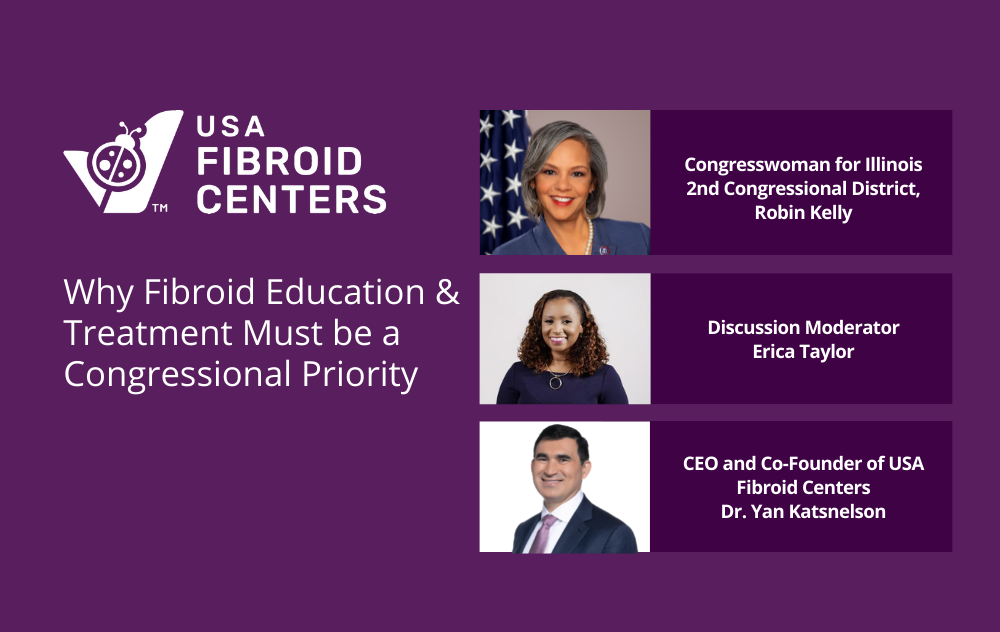
Northbrook, IL, May 27th, 2021— Congresswoman Robin Kelly from Illinois 2nd congressional district took part in USA Fibroid Centers’ Break the Silence, Break the Behavior Video Series, which is working to heighten national awareness about the uterine fibroid epidemic and lack of treatment options. Kelly spoke about the steps needed to make women’s healthcare a priority—especially when it comes to treating fibroid disease.
Kelly is one of the sponsors of the Stephanie Tubbs Jones Uterine Fibroid Research and Education Act 2021 introduced on March 18, 2021, by New York Representative Yvette D. Clarke. Kelly strongly supported the bill that would appropriate $150 million over five years to establish new research funding and better patient and provider education.
A strong supporter of women’s rights to better education, opportunities and healthcare, Kelly talked with USA Fibroid Centers’ Founder and CEO, Yan Katsnelson, M.D. and USA Fibroid Center’s Ambassador and fibroid survivor, Erica L. Taylor. The congresswoman spoke about her priorities, including keeping politics out of doctors’ offices so women can make the best healthcare decisions for themselves and their families.
“Health education is an empowerment tool for women to ensure that they can make informed health decisions that lead to a better life, physically, mentally, and emotionally,” said Kelly, “If women have more information, they can make better decisions about their own health.”
Building awareness about uterine fibroids is not only a health equity issue but an economic imperative. Fibroids cost the U.S. health care system an estimated $9.4 billion annually.[1]
“If fibroid pain is severe, it paralyzes the normal women’s life,” Katsnelson said. “It puts women behind in school, college, or at work because it leads to absenteeism.”
Fibroid disease is the most common disease that women face in their lives. Up to 80 percent of women 50 years old suffer from fibroid disease in the black community, and 70 percent in the white community. Of the 26 million American women diagnosed with fibroids, 10 million are symptomatic.
Both Kelly and Katsnelson advocate for community involvement to help spread awareness and bring about change in fibroid treatment. Uterine fibroids are the leading cause of hysterectomies in the United States. More than 200,000 women undergo hysterectomies because of fibroids, underscoring the need for more effective and less invasive treatments.[2]
“The importance of community involvement is it brings understanding to the seriousness of a debilitating problem like fibroids,” Katsnelson said. “Women shouldn’t have to choose between invasive surgery and continued pain from fibroids, especially when less invasive options, like uterine fibroid embolization, offer a better solution.”
USA Fibroid Centers’ goal is to focus national awareness on uterine fibroids that often go undiagnosed due to lack of education and research. They can cause significant pelvic pain, iron deficiency, anemia, miscarriages, infertility, and heavy bleeding. Uterine fibroids are the most common cause of hysterectomies and fertility problems.
Kelly’s full interview on the Break the Silence, Break the Behavior Video Series can be seen here
For more information about fibroids and treatment options, visit www.usafibroidcenters.com, or call 855-615-2555.
[1] “The Estimated Annual Cost of Uterine Leiomyomata in the United States”.
[2]Northwestern’s Uterine Leiomyoma Research Center Program.
About USA Fibroid Centers
USA Fibroid Centers is the leading provider of minimally invasive fibroid treatment, with an extensive national network of centers. USA Fibroid Centers’ mission is to provide personalized, non-surgical treatment for fibroids using an advanced procedure called Uterine Fibroid Embolization (UFE). USA Fibroid Centers is dedicated to raising awareness of UFE as a treatment option and encouraging more conversation about fibroids. For more information, visit www.usafibroidcenters.com.
About “Break the Silence, Break the Behavior”
The 2021 video series, “Break the Silence, Break the Behavior” offers in-depth interviews with legislators, health activists and celebrities. Its goal is to bring attention to the fibroid epidemic and its effect on women’s health, emotional wellbeing, family lives and careers.
